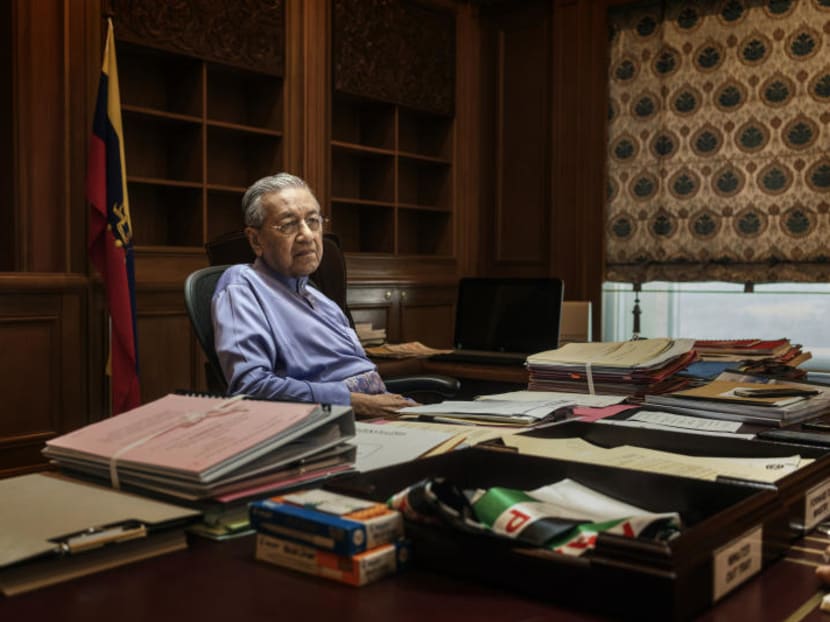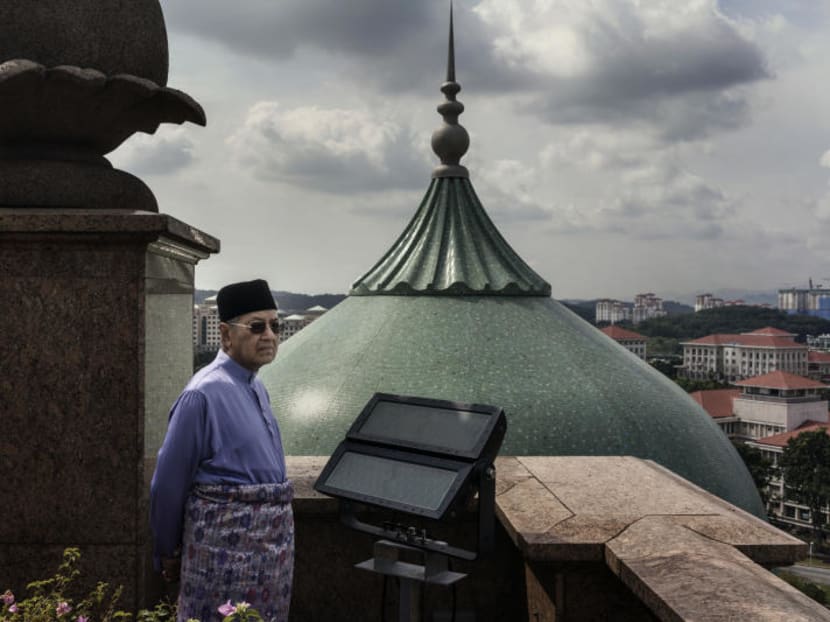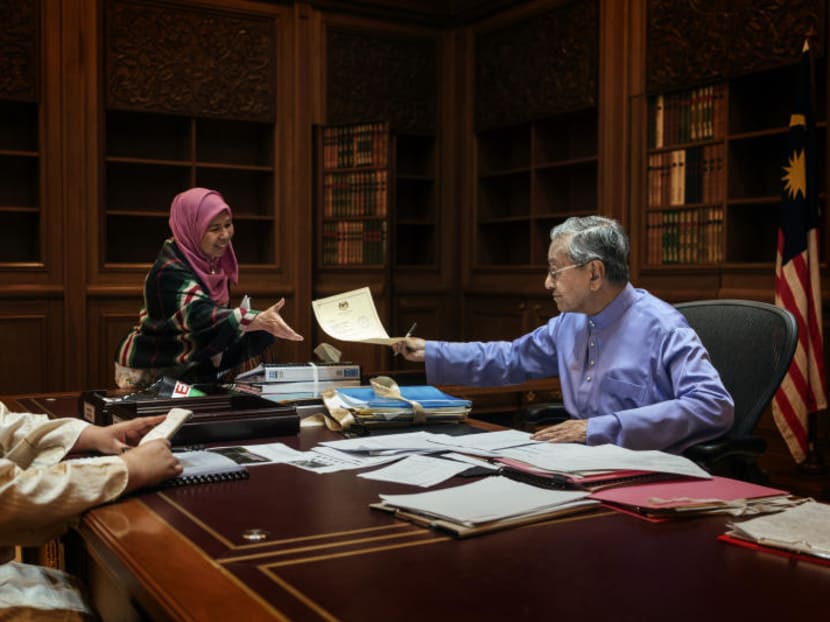Mahathir: Elated by election victory, but deflated by Malaysia’s financial ills
PUTRAJAYA — Racing to figure out the depth of the fiscal crisis that awaited him after his inauguration, Malaysian prime minister Tun Dr Mahathir Mohamad and his aides first entered the Malaysian government offices last month to find an alarming sight: oversize garbage bags filled with shredded documents, a snowstorm of loose papers on the floor, even half-consumed food left by former occupants in a hurry to get out.

Facing a mountain of national debt accumulated under his predecessor, Malaysian prime minister Mahathir Mohamad has no time for apologies, mincing words or President Donald Trump. "The more we look into the previous administration, the more bad things we find,” he said.
PUTRAJAYA — Racing to figure out the depth of the fiscal crisis that awaited him after his inauguration, Malaysian prime minister Tun Dr Mahathir Mohamad and his aides first entered the Malaysian government offices last month to find an alarming sight: oversize garbage bags filled with shredded documents, a snowstorm of loose papers on the floor, even half-consumed food left by former occupants in a hurry to get out.
At the Finance Ministry down the street, Mr Lim Guan Eng, Malaysia’s new finance minister, found computers in which even the highest-ranking bureaucrats were locked out of certain accounts.
In some cases, vital files were accessible to only a single person: Datuk Seri Najib Razak, the nation’s scandal-tainted former prime minister, who had also served as finance minister.
Evidence of financial malfeasance by Mr Najib and his cronies helped Dr Mahathir’s opposition alliance win national elections on May 9, unseating a political force that had governed Malaysia since it gained independence in 1957.
But the euphoria surrounding a historic democratic transition has given way to a more sobering reality.
Even without piecing together a single shredded document, Dr Mahathir, who previously served as prime minister from 1981 to 2003, has discovered that the country is in far worse financial shape than he and his allies had feared.
The national debt, tallied at US$170 billion (S$229 billion) by Mr Najib’s administration, has been reassessed, along with other government liabilities, at US$250 billion. That is 80 per cent of Malaysia’s gross domestic product.
“The more we look into the previous administration, the more bad things we find,” Dr Mahathir said in an interview in the grand, Islamic-style prime minister’s office in Putrajaya, the administrative capital he helped design in the late 1990s.
“Any organisation that had money, the previous government found the means how to take the money.”
The US Department of Justice has already accused Mr Najib, Dr Mahathir’s one-time protégé, of siphoning US$731 million from the country’s investment fund into his personal bank accounts.
At least US$4.5 billion is believed to have been diverted from that fund, known as 1Malaysia Development Berhad, or 1MDB.
But the claims of theft from national coffers extend beyond 1MDB to encompass an astonishing array of government-funded initiatives, from a rural development program and a plan for religious pilgrims to a provident fund and a coal mine in Mongolia.
“All have been raped by the previous government,” said Dr Mahathir, who defected from the governing alliance two years ago. “They have taken money. Now they have lost the money.”
Mr Lim, an accountant and former banking executive, was equally direct.
“They were just robbing the country blind,” he said. “I’m having nightmares practically every day, wondering what land mines I will tread on the following day.”
If Dr Mahathir’s Alliance of Hope had not scored its surprise victory in the elections last month, Mr Lim said, “the nation would have become a basket case.”
He added, “We would be at a terminal stage.”

Photo: The New York Times
Coaxing the nation back to health depends on Dr Mahathir, whose first tenure as prime minister was marked as much by his authoritarian impulses as his success in shepherding Malaysia’s transformation into a upper-middle income country.
During his 22 years in power, Dr Mahathir was accused by critics of playing race politics, muzzling the news media and locking up his enemies.
Yet even Dr Mahathir’s former detractors contend that he is a changed man, cognisant of how unchecked power in the wrong hands can devastate a country.
“He has mellowed, and unlike his first time in office, he has now realised that independent institutions are not a bad thing,” said Mr James Chin, the Malaysian-born director of the Asia Institute at the University of Tasmania.
“Previously, he was all about centralisation of power in the prime minister’s office.”
That assessment is shared by those whose political careers he once derailed. Mr Lim, the current finance minister, was imprisoned twice during Dr Mahathir’s time in office.
“I think it’s Mahathir version 2.0,” Lim said of his new boss. “I think it’s very different from the version 1.0 we saw when he first became prime minister. He’s more reformist.”
He is also a man in a hurry. Dr Mahathir is unquestionably Malaysia’s most charismatic and popular politician, but he will turn 93 next month.
Dr Mahathir has committed to eventually handing power to Mr Anwar Ibrahim, the longtime leader of the opposition who was in prison during the recent elections.
“He’s a man with a mission, driven by the need to get things done in the shortest possible time,” Mr Lim said. “He’s moving at a frenetic pace.”
But Malaysia’s political malaise cannot be traced only to the nine years that Mr Najib was in power.
“The state in which the country is today is not just the result of Najib Razak’s misgovernance but also decades of populist politics and semiauthoritarian practices,” said Ms Sophie Lemière, a Malaysia specialist at the Ash Center for Democratic Governance and Innovation at Harvard University.
Dr Mahathir acknowledged that cleansing a political machine riddled with corruption, not to mention aiding at least six national governments that are investigating missing 1MDB funds, has proved taxing.
“We have asked so many people to resign we are left with a skeleton,” Dr Mahathir said.
But he refused to acknowledge any systemic faults with the Malaysian political system, instead blaming Mr Najib’s astonishing greed for the nation’s predicament. Police raids last month on properties associated with Mr Najib and his family turned up US$28.6 million in cash and more than 430 designer handbags.
“It is obvious that he has stolen money,” Dr Mahathir said, indicating that his government had already accumulated “enough evidence” to have Mr Najib and his wife, Rosmah Mansor, put on trial.
The two have been barred from leaving the country.
“It’s not a question of seeking revenge,” Dr Mahathir said. “It is just the application of the rule of law.”
Dr Mahathir, long known as a workaholic, has kept to a schedule that would be punishing for a leader half his age.

Photo: The New York Times
This week, he made his first foreign trip, to Japan, to court investors who could counter China’s hold on the Malaysian economy. After returning late Tuesday (June 12), he woke up before dawn to pray. He has been fasting for the Islamic holy month of Ramadan.
Dr Mahathir’s mental agility appears uncompromised, and his judgments are as pointed as ever.
He has shown little patience for US president Donald Trump, who welcomed Mr Najib to the White House last year and once called him his “favourite prime minister.”
“I have no plans to go and see him,” Dr Mahathir said of Mr Trump, whom he called volatile. “I don’t know how I can deal with a person who is so much like a chameleon.”
Dr Mahathir has already distanced himself from his vow to hand over power within two years to Mr Anwar, his onetime deputy who was released last month from prison.
After all, Dr Mahathir joked, he had suggested that time frame only because some thought he might become senile at age 95.
Mr Anwar has been jailed twice, once during Dr Mahathir’s tenure, after the two fell out.
Yet Dr Mahathir refused to accept that Mr Anwar’s conviction for sodomy and corruption was in any way politically motivated. The police were the ones who pursued the case, he said in the interview — though at the time, in 1998, he publicly said that “I cannot accept a man who is a sodomist as leader of the country,” and that he felt that Mr Anwar had challenged his leadership.
“I didn’t do it. It was done in the proper way,” Dr Mahathir insisted on Wednesday. “It was up to the judge to decide whether there was a case or not.”
Mr Lim admitted that Dr Mahathir never expressed regret for jailing him — but also said it was vital not to let old grievances fester.
“I forgive, but that doesn’t mean I will forget,” Mr Lim said. “I think the most important thing is to look forward.”
As for Malaysia’s new prime minister, who now has a rare opportunity to reshape his legacy, transform himself into a democratic icon and erase his strongman reputation, Dr Mahathir refuses to engage in sentimentality.
“When you die, they rewrite your story,” he said. “So when I am not around, they can say what they like.” THE NEW YORK TIMES






